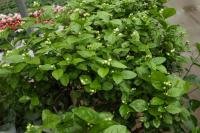1、 Curing method
1. Temperature: different growth periods have different requirements for temperature. It is both cold and heat resistant. When the curing temperature is 25 ℃, the growth state is the best. In the extremely cold zone, if the temperature is lower than 30 degrees, it can also survive the winter, but the yield will be reduced
2. Watering: its transpiration is relatively small, which means that it does not consume much water. Therefore, unless it is dry weather, it generally does not need watering. Watering in dry weather should also be based on the state of the soil. Watering is only required when the soil is completely dry. Watering should not be done too often. Watering once every ten days is the most reasonable
3. Fertilization: the demand for nutrients is different in different periods, so the fertilization methods are also different. The seedling stage is the time when the nutrient consumption is the greatest. Before planting, the soil needs to be mixed with base fertilizer. After one month of planting, it needs to be fertilized. Before autumn, it needs to be fertilized again. For adult plants, fertilize once every quarter, about four months
4. Light: its growth needs a lot of light. Only when the light is sufficient can the plant grow well. If possible, it's best to have sunshine all day. If you can't meet the sunshine all day, the minimum sunshine time every day should be five hours
2、 Breeding skills
1. Reproduction: it can reproduce by sowing. The breeding time is generally autumn or spring. No matter when breeding, furrow planting is required. Before planting, base fertilizer needs to be mixed in the soil. After sowing, cover it tightly with soil, and then water it once. Generally, seedlings can emerge in about two weeks
2. Scaffolding: if the plant grows in a relatively narrow space, it needs scaffolding to help shape. For example, asparagus potted plants need scaffolding when it grows to 15 cm
3、 Problem diagnosis
1. Peculiar smell: normal asparagus has a smell of grass or no taste. If asparagus has a peculiar smell, it is likely to be polluted. At this time, do not use inorganic fertilizers and avoid pesticides, which will slow down
2. Hollow shoot: the hollow problem of the plant is caused by malnutrition. When applying fertilizer, we should reasonably match the fertilizer species, use more phosphorus and potassium fertilizer and avoid the use of nitrogen fertilizer
4、 Other issues
1. Edible: edible
2. Toxicity: non toxic

 jackfruit
jackfruit snake plant
snake plant hibiscus
hibiscus hydrangea
hydrangea lavender
lavender Green roses climb al...
Green roses climb al... If you don't pay att...
If you don't pay att... Management of four g...
Management of four g...
































